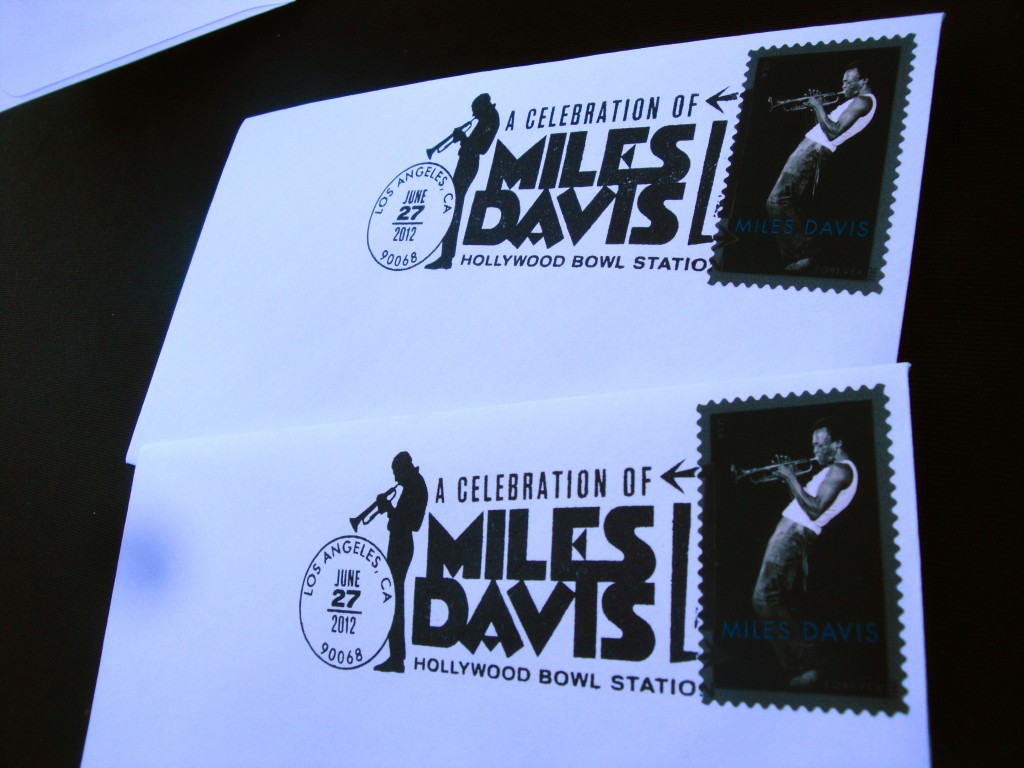Legend Miles Davis Immortalized on Forever Stamp
Miles Davis‘ musical career spanned damn near 50 years. The outcome is not only Davis being credited with ushering in numerous forms of jazz music, but he is rightly considered one of the most influential musicians of the 20th Century.
In 2009, The House of Representatives passed a resolution unanimously (409-0) honoring Davis’ masterpiece, Kind Of Blue, as a National Treasure.
Three years since that resolution, another entity of the government, the US Postal Service, has honored Miles Davis with his very own Forever stamp.
On Wednesday, June 27th, at the Hollywood Bowl museum terrace, that stamp was unveiled at a gathering of fans, family and fellow musicians.
Henry Rollins gave a powerful speech on Davis, in which he said:
“There’s nothing more American than jazz music, there’s nothing more American than Miles Davis…If you think for a moment all the different ways he changed his music with his career behind him and his artistic integrity in front of him, at all times, what some people would think is a risk, for Miles Davis was just another day of his creative muse.
And a long time ago when Miles Davis started playing music, this country had an awful disfunction: which we’re working past, we’re getting better all the time, and bebop music is one of the most important and most powerful nails in the coffin of racism and inequality in America.
And the great players like Charlie Parker, Dizzie Gilespie, Miles Davis and many others, they got right in the teeth. Amazing players playing amazing music and being told they can’t walk over a certain line painted on the floor of the dance club because they were the wrong color.
As you know, famously, Miles Davis would often walk over the painted line on the floor, find the club owner, and glare at him, defining him to do something about it. By doing that, by that brave act, that is how you effect change in this country.”
(Henry Rollins)
I spoke to Davis’ first wife, Frances Taylor, about her introducing Davis to flamenco music which inspired him to make Sketches Of Spain.
Taylor said, “As a ballerina, I was touring all over Europe and South America, when [touring] in Barcelona, I fell in love with the music and the dance. So when [Miles and I] were together, I thought, ‘It would be a wonderful idea to have his sound and the sound of flamenco together.’ And there was a company called Roberto Iglesias that came to New York, and I said, ‘Miles, I’m gonna get tickets, you gotta come.’ He didn’t want to go, but I made him anyway, and when we left the theater, he was so taken by the music, we went to the famous Colony Record Shop on 52nd and Broadway, and he bought every flamenco album there was. And then he called Gil Evans the next day and said, ‘This is what I wanna do.’ And it’s so great because that’s the only time he let me sit in while he was recording.”
(Frances Taylor and Miles Davis, courtesy of Ms. Taylor)
I asked Davis’ son Erin Davis if his father’s music is relevant to today’s generation.
“The music he’s made is timeless and I think that’s what the relevance is, it’s timeless, and there’s always a time and a place for it, said Erin, “it never feels dated or like something that you can overlook. It’s always gonna sound good and it’s always gonna be true. It’s never gonna be like, ‘Oh, they were using that keyboard then, it sounds cheesy.’ I think the stuff he did his entire career is pretty timeless, even the stuff that is electric, that’s even got keyboards and stuff like that, it’s just well done. If you do something well enough, it’s not disposable…”
I asked Davis’ nephew, Vince Wilburn Jr., if he thinks Davis’ music sounds different to every generation.
“Well, every time I hear it, I hear different things. In any of the tracks. Things that stand out at me,” Wilburn explained, “it just makes you think, it’s beautiful to digest. It’s forever evolving, ’cause that’s the way he thought. His thought process was that way.”
Henry Rollins spoke of Davis’ On The Corner as being an inspiration for him in punk rock.
“When you see Miles as an icon, it’s hard to believe he ever got a bad review,” said Rollins, “and he got a ton of them. I mean, there’s a very famous album called On The Corner and the critics went out of their way to go, ‘He’s lost his touch, he’s out of his mind.’ When the re-release of the album came out years ago, a lot of those critics came out and said ‘OK, he was right, we were wrong, we’re sorry, he was right’…and as an American musician, he’s completely unique. In that there’s nothing like him, as far as recording ethic, his bravery, he’s really broken the mold.”
To read more about what Rollins had to say about Miles Davis, go here.
At the end of the heart-felt ceremony, after a few performances and appearances by artists such as Metallica‘s Robert Trujillo and long-time Davis collaborator Herbie Hancock, Miles Davis’ stamp was unveiled by his family and members of The Los Angeles United States Postal Service.
After the ceremony, “A Celebration Of Miles Davis” performance took place at The Hollywood Bowl, hosted by Herbie Hancock. Jimmy Cobb‘s “So What” Band did a complete rendition of Kind Of Blue along with many other performers paying homage to the musical legend.
(The Hollywood Bowl’s “A Celebration of Miles Davis” show.)
words/photos by: Ani Yapundzhyan





